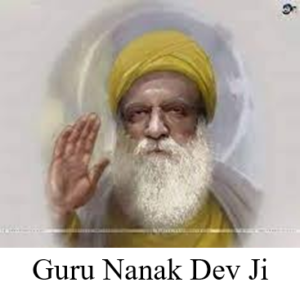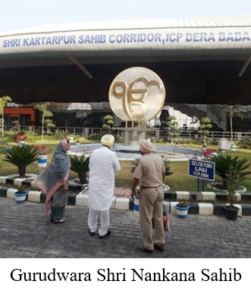Sri Guru Nanak Dev ji Birthday
Dr. Jaswant Singh Puri
Sri Guru Nanak Dev Ji enlightened and blessed this world with his dawn on 21
October, 1469 in Talwandi, now known as Nankana Sahib which is situated about
64 kilometers westward from Lahore, Pakistan. He was the founder of Sikhism who
rekindled the people’s dormant psyche to lively ones. His father Kalu Chand
Bedi succeeded his grandfather Shiv Ram Bedi as incharge of the Muslim Chief of
a fief, Talwandi being the main city of the fief. Guruji’s ancestors belonged to the
Kshtariya heroes and his mother Tripta also belonged to Kshtariya family of the
upper middle class status.
Sri Guru Nanak Dev Ji’s early education was in a local school. He got intensive
coaching in Sanskrit, Persian and Punjabi. Infact, he was destined to be a World
Teacher, a Divine Prophet who was born with celestial status whose divinity is
above earthly institutions.

Sri Guru Nanak Dev ji did not believe in a life of alienation and stressed for
household life. He was married at the age of 16 to Mata Sulakhani, daughter of a
Kshatriya Mul Chand of Batala and was blessed with two sons – Sri Chand and
Lakhmi Chand. He taught the people to lead a domestic life and chant His name
while performing all the household activities. He was the one who achieved mystic
vision of divine in August, 1507 and when he came back from the abode of God by
dipping himself in the Bein river for three days, God then ordered him to go back to
the world and spread the message of Love, Peace, Harmony. From 1507 till 1521
A.D., he took up the missionary work by travelling far and wide which are called
Four Spiritual Journeys – First and Second Journeys (1507-1515) to East and South
of India, Sri Lanka; Third journey (1515-1517) to the Himalayas and the Tibet,
Fourth Journey (1517-1521) to West Asia – Baghdad, Mecca, Medina. He was
always accompanied by his two disciples- Bala, a Hindu Sandhu Jat and Mardana –
a Muslim Mirasi- Rebeck Player (Rababi Mardana). These four journeys are called
‘Udasis’.
Sri Guru Nanak Dev taught the people to lead a life of spirituality, discard caste and
have faith in God. He said:
“What merit does caste possess
Search for the truth within”
Preaching of humanism had immense impact on general public. He persuaded the
Sangat that they should make the service of humanity as part of their lives. He
initiated the practice of ‘Guru Ka Langar’. He holds that the creation created by
Omnipotent, Omnipresent and Omniscient God can be obtained by the Guru’s
Grace.
“True in the prime, True in the beginning of
ages, True he is even now and true he verily
shall be”
He attached great importance to ‘Naam Simran’. He emphasized on the concept of
transcended God which is celestial, infinite, formless, eternal, supreme, sovereign,
creative, radiant etc. His ‘Japuji Sahib’ is the leading key to the holy volume of
Guru Granth Sahib. It was his dynamic guidance that enlightened many schools of
mysticism and persuaded Bhai Gurdas to eulogise Sri Guru Nanak’s practical
ethics:
“Mitti Dhund Jag Chaanan Hoa”
His divinity urged the people to discard caste and have faith in the Almighty. His
‘Langar System’ or Community Kitchen teaches us the sense of equality of caste,
creed and religion where meals are served without any restriction. His teachings
were beyond the limitations of caste and known as “Hindu Ka Guru Musalman Ka
Pir”. He laid much emphasis on the equality of women and quoted:
“Within a woman, the man is conceived and from a woman he is born—With a
woman the system of propagation goes ahead—– Why call her bad from
whom are born the kings”.
He said:
“By the Lord’s order bodies are produced, His order cannot be narrated”
It is true that Sri Guru Nanak Dev was a social reformer but he did not speak
against any section of community.
The last seventeen years of Sri Guru Nanak’s life were stable and he resided in
Kartarpur; a town which he founded himself, as a preacher and a farmer. Sri Guru
Nanak Dev Ji’s compositions are recorded in Sri Guru Granth Sahib. There are 974
compositions in nineteen ragas some of which are Raag Sri, Majh Gauri,
Wadhans, Sorath, Dhanasri, Tilang, Suhi, Bilawal, Ramkali, Tukhari, Bhairav,
Sarang, Malhar and Prabhati.
The Divinely inspired Japuji Sahib is the Morning Prayer which is remarkable
for its Divine Bliss.
Asa Di Vaar, Five Shabads included in the Rehras (Evening prayer) and three
shabads in Sohila (bed time prayer) are the recitation of that Awakened Soul who
preached noble deeds, good actions and his Simran to attain salvation, irrespective
of caste, creed and religion. He merged with the Almighty God on 22 September,
1539 at Kartarpur. There were arguments during the funeral rites of Guru Ji as to
who would own the body – be it Sikhs, Hindu or Muslims. Then, Guru Ji introduced
the concept of ‘Joti Jot’ and Sikhs, the Hindus, and the Muslims could not find his
mortal body except the ‘Chaddar’ which they divided and performed rituals
according to their own customs. All his devotees and followers adhere and believe
in the ‘Hukam of the lord’ – The Will of the Almighty God.

